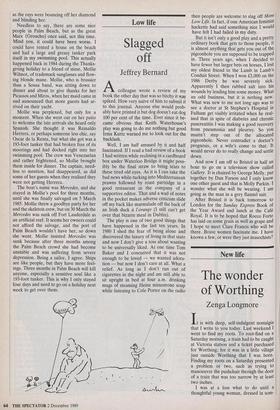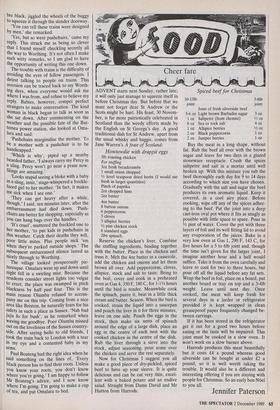New life
The wonder of Worthing
Zenga Longmore
It is with deep, self-indulgent nostalgia that I write to you today. Last weekend I went to find my roots. To root-find on a Saturday morning, a train had to be caught at Victoria station and a ticket purchased for Worthing; for it was in a little village just outside Worthing that I was born. Finding my roots on a Saturday presented a problem or two, such as trying to manoeuvre the pushchair through the door of a train that was too narrow by at least two inches.
I was at a loss what to do until a thoughtful young woman, dressed in som- bre black, jiggled the wheels of the buggy to squeeze it through the slender doorway. `You can tell these trains were designed by men,' she remarked.
`Yes, but so were pushchairs,' came my reply, This struck me as being so clever that I found myself chuckling secretly all the way to Worthing. It's not often I make such witty remarks, so I am glad to have the opportunity of writing this one down. The trouble with trains is the difficulty of avoiding the eyes of fellow passengers. I detest talking to people on trains. This aversion can be traced back to my Worth- Mg days, when everyone would ask me where I was from, and refuse to believe my reply. Babies, however, compel perfect strangers to make conversation. The kind woman in black began to talk as soon as she sat down. After commenting on the Weather and the possible fate of the Bat- tersea power station, she looked at Oma- lara and said: `Pushchairs marginalise the mother. To be a mother with a pushchair is to be handicapped.' `Which is why', piped up a nearby bearded father, always carry my Percy in a sling. Percy won't go near a pram now. Slings are amazing.' `Looks stupid seeing a bloke with a baby in a sling, innit,' stage-whispered a freckle- faced girl to her mother. 'In fact, it makes me sick when I see one.'
`They can get heavy after a while, though,' I said, ten minutes later, after the embarrassment had died down. 'Push- chairs are better for shopping, especially as you can hang bags over the handles.' `It's cruel', muttered the freckled one to her mother, 'to put kids in pushchairs in this weather. Catch their deaths they will, Poor little mites. Plus people nick 'em when they're parked outside shops.' The subsequent embarrassed silence lasted us nicely through to Worthing. The village looked prosperously pic- turesque. Omalara went up and down until night fell in a swirling mist. Because the residents consider street lights too vulgar to erect, the place was swamped in pitch blackness by half past four. This is the main reason Olumba refused to accom- pany me on this trip. Coming from a nice area like Brixton, he naturally fears for his safety in such a place as Sussex. `Nah bad juju fo for bush', as he remarked when waving me goodbye. Poor Olumba missed out on the loveliness of the Sussex country- side. After saying hello to old friends, I took the train back to London with a tear in my eye and a contented baby in my arms.
Paul Boateng had the right idea when he said something on the lines of, 'Every black person has to find their roots. Unless you know your roots, you don't know where you're going.' I am happy to follow Mr Boateng's advice, and I now know where I'm going. I'm going to make a cup of tea, and put Omalara to bed.











































































 Previous page
Previous page